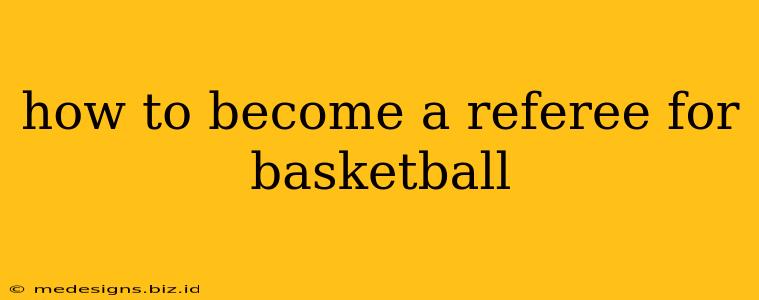So, you want to become a basketball referee? It's a challenging but rewarding role that puts you right in the heart of the action. This guide will walk you through the steps to achieve your goal, from initial training to securing games and advancing your career.
1. Assess Your Suitability
Before you dive in, honestly assess if you have what it takes. Being a basketball referee requires:
- Fitness: You'll be running up and down the court for extended periods. Good cardiovascular health and stamina are essential.
- Knowledge of the Rules: A thorough understanding of FIBA or NCAA (depending on your level of officiating) rules is paramount. No guesswork allowed!
- Impartiality: Fairness and objectivity are key. You must be able to make tough calls without bias.
- Communication Skills: Clear and concise communication with players, coaches, and fellow officials is crucial for a smooth game.
- Thick Skin: Referees face criticism – you need to handle pressure and maintain composure under scrutiny.
2. Get Trained
Formal training is the cornerstone of becoming a successful basketball referee. Look for opportunities through:
- Local Basketball Associations: Many local leagues offer referee training programs for aspiring officials. These programs often provide a structured curriculum covering rules, mechanics, and game management.
- State or National Governing Bodies: These organizations (like your state's athletic association or a national basketball federation) typically provide more comprehensive training and certification programs, leading to higher-level officiating opportunities.
- Online Courses: Several online platforms offer courses covering basketball rules and officiating techniques. While these can be a great supplement, they usually shouldn't replace hands-on training.
What to Expect in Training:
Expect your training to cover various aspects of officiating, including:
- Rule Interpretation: Deep dive into the rulebook, focusing on key rules and their applications.
- Positioning and Mechanics: Learning proper court positioning and efficient movement to maintain control.
- Communication Techniques: Mastering clear and concise communication with players and coaches.
- Game Management: Developing strategies for handling various game situations effectively.
- Conflict Resolution: Learning techniques to de-escalate conflicts and maintain order.
3. Gain Experience
Once trained and certified, start gaining experience by:
- Officiating Lower-Level Games: Begin at the youth or recreational level. This provides a safe environment to practice your skills and build confidence.
- Networking: Connect with other referees, coaches, and league organizers. Networking can lead to more opportunities and mentorship.
- Seeking Feedback: Actively solicit feedback from experienced referees, coaches, and even players. Constructive criticism is invaluable for improvement.
- Reviewing Your Performances: Record your games (if possible) and review them critically. Identify areas for improvement and work on them consistently.
4. Advance Your Career
As you gain experience and improve your skills, you can strive for higher-level officiating:
- Higher-Level Leagues: Progress to higher-level leagues, such as high school, college, or even professional leagues. This requires consistent high-quality officiating and further training.
- Specialization: Consider specializing in a specific area, like tournament officiating or international games.
- Mentorship: Seek mentorship from experienced referees. Their guidance and insights can accelerate your professional development.
Essential Qualities of a Successful Basketball Referee
Beyond the technical skills, certain qualities significantly impact a referee's success:
- Impartiality: Maintain fairness and objectivity throughout the game, regardless of team or player.
- Decisiveness: Make quick, accurate calls with confidence. Hesitation can lead to disruptions.
- Composure: Remain calm and professional under pressure. Handling stressful situations gracefully is crucial.
- Fitness: Maintain excellent physical fitness to keep up with the pace of the game.
- Continuous Learning: Stay updated on rule changes and officiating best practices.
Becoming a basketball referee takes dedication, training, and perseverance. But by following these steps and cultivating the right qualities, you can achieve your goal and enjoy a fulfilling career in the exciting world of basketball officiating.
